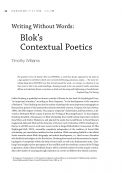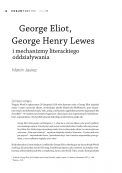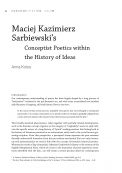Writing Without Words: Blok’s Contextual Poetics

The greatest terror of Danny’s life was DIVORCE, a word that always appeared in his mind as a sign painted in red letters which were covered with hissing, poisonous snakes. … The most terrifying thing about DIVORCE was that he had sensed the word—or concept, or whatever it was that came to him in his understandings—floating around in his own parents’ heads, sometimes diffuse and relatively distant, sometimes as thick and obscuring and frightening as thunderheads. (...)
George Eliot, George Henry Lewes and the Mechanisms of Literary Influence

In Lieu of an Introduction
Virginia Woolf has a resonant, often-quoted sentence in her famous essay on George Eliot from 20 November 1919, asserting that Middlemarch, for all of its flaws, was “one of the few English novels written for grown-up people.”[1] In a less frequently quoted passage grappling with the previously mentioned flaws, the most important British high-modernist author writes:
It is partly that her hold upon dialogue, when it is not dialect, is slack; and partly that she seems to shrink with an elderly dread of fatigue from the effort of emotional concentration. (...)






